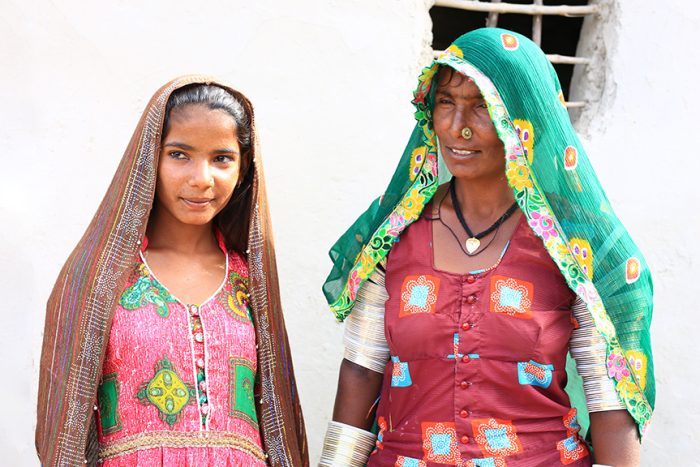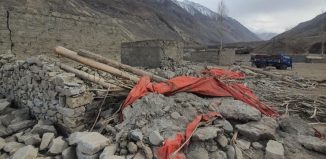Seeds of Change: Soraths fight for Girls Education in Thantrai & beyond
Sorath lives in village Thantrai, a thirty-minute bus ride from Umerkot, with its schools and colleges. Yet she is a farm labourer and has never received any formal education. So is her husband. But her daughter and three younger sons all attend a primary school about two kilometres from the village. Though she now feels it should have been that way for her as well, but even for her children it was not always like this.
Why, only four years ago, like every other woman, Sorath too was against sending her daughter to school. For one, it was a bit of a walk from home and then girls were not supposed to be educated ‘lest they get strange ideas in their heads’. As well as all that, as farm labourers, she and her husband rarely got work every day and their monthly average income was never above PKR 5000 (Approx. USD 18). That would have been too little to maintain four children’s education despite school being free.
Rewind three years into the past and one finds Community World Service Asia’s social mobilisers visiting the village. The awareness raising sessions that followed had a deep impression on this apparently very clever woman. Here was talk of the equality of genders and of the ability of women to do anything that a man could and yet also give birth which man could not. Here she heard that it was because of all this that the girl child had the same right as her brother to be educated.
“I thought to myself that I have been illiterate all my life and therefore condemned to being a farm labourer who spends full summer days picking cotton for a mere PKR 300 (Approx. USD 1). Why does my daughter have to be similarly handicapped?” says Sorath. After the first couple of sessions with the social mobilisers, Sorath took her daughter to school where she learned that without the children’s B Form1 as issued by the National Database and Registration Authority, the children could not be enrolled.
That was the first thing Sorath and her husband went after. Armed with that document the girl who, in the words of her mother, ‘just growing old helping me with housework’ was put in school. Sorath now became the sole crusader in Thantrai for the cause of girls’ education. She went from door to door exhorting parents to step out and do the needful. Those who mouthed the ancient ‘wisdom’ of denying girls education were sharply rebuked and presented with the example of her own daughter in school. She taunted parents for planning their daughters’ future to be just as their own past and present had been. Unrelenting in her canvassing, Sorath soon had forty girls from her para (precinct) of the village in school.
“My daughter is so happy about her education, she is up early and dressed long before it is time to walk to school. She gets her brothers ready and then goes around the para coaxing the other girls to hurry,” says Sorath. Unsurprisingly, the girl who started late is already in Grade 3 and doing well.
In acknowledgement of her school enrolment campaign, the District Education Office organised a seminar in Umerkot where Sorath was a delegate. But on stage, she experienced a bit of a stage fright and did not say as much as she would otherwise in community consultations and her door to door campaigning. Nevertheless, the officers in attendance saw the fire inside and resolved to take her to the provincial seminar in Karachi. Sorath says she had never even been to Mirpur Khas and was in a state of sheer fright that she would be lost in the city. Even though no one from her family had ever been to the city, she planned to take her husband, father-in-law and her three sons to help her navigate the big city. It took some considerable effort by Nusrat, the CWSA social mobiliser, to assure her that all would be well because she would be with Sorath. In the end, her husband only accompanied her.
Once in the city, Sorath and her man, despite being chaperoned, were alarmed. The tall buildings, the speeding traffic, the endless bustle of the sea of humanity were all new to them. Seeing the signs on the roads, Sorath says she thought of her daughter who would have been able to read for them and know which way to go and a wave of satisfaction swept over her for having done the right thing in sending the child to school.
Before she was called on stage, a short documentary about her life in the village was screened. Only three days earlier, a team had arrived with an ‘airplane’ (drone) to film her at work around the home and now the whole world was seeing how she, a simple farm labourer, spent the days of her life. As she was called to step onto the stage, fright took hold of her. But once behind the lectern, that fear dissolved, and Sorath spoke of how CWSA social mobilisers had altered her view on the need for education for the girl child. And that she became the first mother in the village to send their daughter to school.
She spoke of her tireless campaign around her village for families to procure the B Form for their children without which they could not be in school. And she told the audience how she had virtually harangued women to not be afraid of their daughters’ education. In the end she demanded of the provincial education minister to provide her village a school – one that was preferably secondary level. The applause was respect and appreciation Sorath had never known before. One hopes that the minister’s promise of seeing to it that the village had a school was not drowned out in the din of clapping.
Back at home, she went around telling the others what the big city and its even bigger ocean looked like. Why, she was the first one in the village to have taken this trip. And if like her these women ensured their children’s education, they too were likely to make a similar trip sometime in future.
Sorath recounts that the girls who attend school can clearly be told apart. They have neater appearances, combed hair and they carry themselves with more grace than their peers who have not yet started school. Harchand para, on the other side of the village, still has most girls out of school and that is now Sorath’s target. “There are at least sixty young girls there who I want to see in the classroom,” she says. Sorath has heard girls whispering that they want to be like the visiting social mobilisers of CWSA and she tells them they can be all that and more if they attend school. She admits it was this very strategy that got parents and girls of her own para to seek education.
“I know college education will be expensive. But no matter how long and how hard I have to pick cotton and hoe the landlord’s fields, I’ll do it and see my daughter through to the highest level of education she wants to attain,” says Sorath.
One can see that this is not just an empty boast. It is clear that Sorath’s connection to her land and her commitment to fostering growth is not just in crops, but in the minds and lives of the girls in her village.
- Child Registration Certificate (CRC) ↩︎







